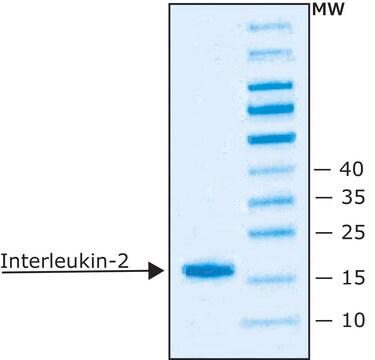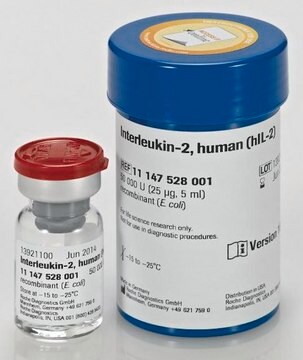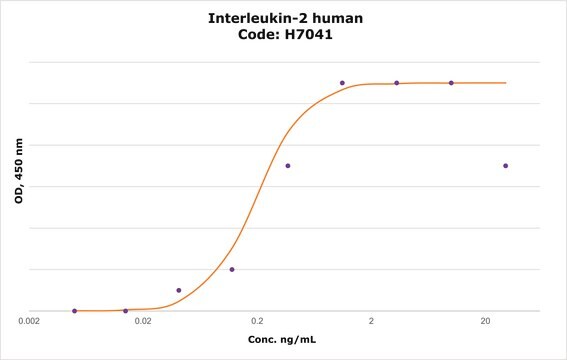I4161
Interleukin-2 from mouse
IL-2, recombinant, expressed in E. coli, carrier free
Synonyme(s) :
mIL-2, IL-2, T-cell growth factor
About This Item
Produits recommandés
Source biologique
mouse
Niveau de qualité
Produit recombinant
expressed in E. coli
Pureté
≥97% (SDS-PAGE)
Forme
lyophilized powder
Puissance
≤0.2 ng/mL ED50
Qualité
endotoxin tested
Poids mol.
17.2 kDa
Conditionnement
pkg of 5X20 μg
pkg of 20 μg
Technique(s)
cell culture | mammalian: suitable
Impuretés
≤0.200ng/ml
Couleur
white
Numéro d'accès UniProt
Conditions d'expédition
dry ice
Température de stockage
−20°C
Informations sur le gène
mouse ... Il2(16183)
Vous recherchez des produits similaires ? Visite Guide de comparaison des produits
Catégories apparentées
Actions biochimiques/physiologiques
Forme physique
Reconstitution
Mention d'avertissement
Warning
Mentions de danger
Conseils de prudence
Classification des risques
Eye Irrit. 2 - STOT SE 3
Organes cibles
Respiratory system
Code de la classe de stockage
10 - Combustible liquids
Classe de danger pour l'eau (WGK)
WGK 3
Point d'éclair (°F)
Not applicable
Point d'éclair (°C)
Not applicable
Certificats d'analyse (COA)
Recherchez un Certificats d'analyse (COA) en saisissant le numéro de lot du produit. Les numéros de lot figurent sur l'étiquette du produit après les mots "Lot" ou "Batch".
Déjà en possession de ce produit ?
Retrouvez la documentation relative aux produits que vous avez récemment achetés dans la Bibliothèque de documents.
Les clients ont également consulté
Notre équipe de scientifiques dispose d'une expérience dans tous les secteurs de la recherche, notamment en sciences de la vie, science des matériaux, synthèse chimique, chromatographie, analyse et dans de nombreux autres domaines..
Contacter notre Service technique





